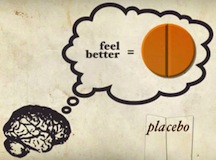 Placebos are sugar pills (or saline solution) with no medical benefit, yet people who take them frequently get better. Does that make them legitimate medicine? Perhaps. The possibility is great enough that Harvard just opened an institute known as the Program in Placebo Studies and the Therapeutic Encounter.
Placebos are sugar pills (or saline solution) with no medical benefit, yet people who take them frequently get better. Does that make them legitimate medicine? Perhaps. The possibility is great enough that Harvard just opened an institute known as the Program in Placebo Studies and the Therapeutic Encounter.
The rapidly evolving field of neuroimaging (such as MRIs) has allowed researchers to monitor real time how a patient’s body responds to treatment. Neuroimaging shows that when a patient believes (or is deceived into believing) a placebo is an effective treatment, the body tends to respond positively. Physical changes occur in the body as a result of a treatment that by all rights should cause no change. Obviously, some sort of mind/body connection occurs, the outlines of which science is only beginning to tease out.
How great is the power of belief? Ritual? Suggestion?
Personally, I believe science will eventually find reams and reams of hard evidence for a tremendously strong mind/body connection and that the saying, “Think you can, think you can’t, you are right,” has a solid factual basis.
Closing quotes:
“Thoughts held in mind, attract in kind.”
“What you focus on expands.”
“Your imagination is your preview of life’s coming attractions.” — Albert Einstein
Note: This post is inspired by the article, “The Power of Nothing,” by Michael Specter, The New Yorker, December 22, 2011, pg. 30.


0 Comments